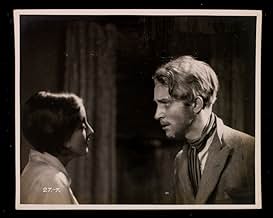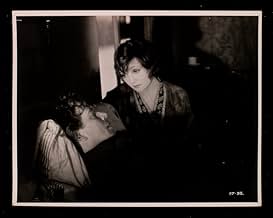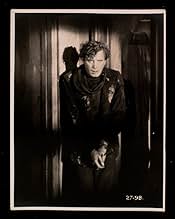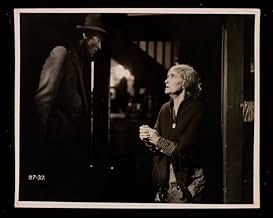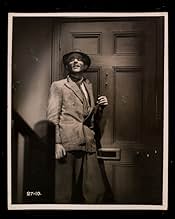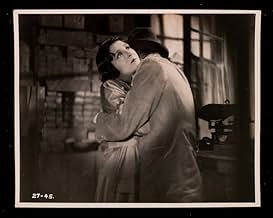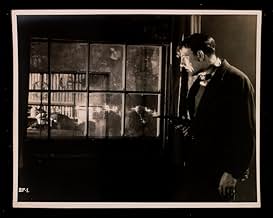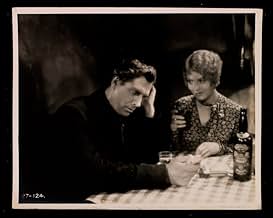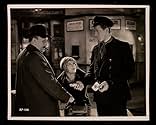IMDb-BEWERTUNG
7,2/10
319
IHRE BEWERTUNG
Füge eine Handlung in deiner Sprache hinzuIn 1920s Ireland, an IRA man betrays his best friend to the police, mistakenly believing him to be his mistress's lover.In 1920s Ireland, an IRA man betrays his best friend to the police, mistakenly believing him to be his mistress's lover.In 1920s Ireland, an IRA man betrays his best friend to the police, mistakenly believing him to be his mistress's lover.
- Regie
- Drehbuch
- Hauptbesetzung
Johnny Butt
- Publican
- (Nicht genannt)
Ray Milland
- Sharpshooter
- (Nicht genannt)
Ellen Pollock
- Prostitute
- (Nicht genannt)
Harry Terry
- Gallagher's Henchman
- (Nicht genannt)
Empfohlene Bewertungen
When I bought this movie on Grapevine video I really wasn't expecting too much, but, the quality of the print was pretty good. This British movie was made during the transition from silents to talkies and had it's own music soundtrack, however, halfway through the movie it suddenly becomes a talkie and that's where it's weakness lies as the two leads were both European, Lars Hanson was Swedish and Lya Di Putte was, I believe, Hungarian, so the director did what Hitchcock did to Anni Ondra in "Blackmail", he had two actors off set speaking the lines while Hanson and Di Putte mouthed their words and that's the films weak point as they speak their lines very slowly compared to the other actors around them and for Hanson's character the voice simply doesn't fit. Apart from that, the movie is actually pretty good, the story of a man who betrays a friend and attempts to avoid the vengeance of the men's other friends. I have to say that people say Hanson didn't look the part of Gypo Nolan, I disagree, he does pull it off, but, the voice actor doing his voice doesn't help and having heard his real voice I did find it disconcerting when I heard the voice of the other actor coming out of his mouth. But, all in all this is a very good early British movie and would recommend it to anyone who is interested in that era of film making,.
This version is indeed not at all like the 1935 John Ford film and, while it is far less faithful to the book than Ford's version, it has rather more atmosphere in many ways. However there is a real problem with the version that most reviewers here have evidently seen.....
The character of Gypo Nolan in the book is a lumbering giant of a man who is however a bit simple. The story was probably rewritten because of the available stars. Victor Mclaglen in 1935 was perfect for a lumbering simpleton but this would hardly have been possible for Lars Hanson. Te fact too of having Pola Negri required a passionate love-relationship which is not there in the book.
There are disadvantages to these changes. The original story revolves almost entirely around Gypo and the fact of his being simple and not really knowing what he is doing accounts for the relatively motiveless betrayal but also provides the element of redemption. Here other motivation has to be provided and different grounds for redemption and the result (the railway station scene for instance)seem rather contrived.
But Gypo's simplicity in the book is what makes the story sentimental(and even more sentimental in the Ford film), so, by altering the story, Robison has made his version rather more like a German thriller of a period. Since I am personally not a great fan of sentimentality (especially when combined with religiosity), I rather appreciate these changes and, in terms of atmosphere and cinematography, I much prefer the Robison film although it is true that the story here is rather less coherent or believable than in the 1935 film which follows the book.
The Informer was made both as a silent film and as part talkie and for a long time the part-talkie version was thought to the lost. Now it has been rediscovered and, in the original version of this review, I was concerned that the silent version seems to have disappeared. It is interesting (historically) to have the part-talkie, but the dubbing of the voices is so atrocious that it completely spoils the films. What one really wants to watch is the silent version.
However, the good news is that I was over-pessimistic. Not only does the silent version still exist but it has been well restored and is readily available. By all means have a look at the part-talkie out of interest but for goodness' sake watch the film for real in the silent version (it can be recognized as being a little longer than the part-talkie on account of additional titlecards).
The character of Gypo Nolan in the book is a lumbering giant of a man who is however a bit simple. The story was probably rewritten because of the available stars. Victor Mclaglen in 1935 was perfect for a lumbering simpleton but this would hardly have been possible for Lars Hanson. Te fact too of having Pola Negri required a passionate love-relationship which is not there in the book.
There are disadvantages to these changes. The original story revolves almost entirely around Gypo and the fact of his being simple and not really knowing what he is doing accounts for the relatively motiveless betrayal but also provides the element of redemption. Here other motivation has to be provided and different grounds for redemption and the result (the railway station scene for instance)seem rather contrived.
But Gypo's simplicity in the book is what makes the story sentimental(and even more sentimental in the Ford film), so, by altering the story, Robison has made his version rather more like a German thriller of a period. Since I am personally not a great fan of sentimentality (especially when combined with religiosity), I rather appreciate these changes and, in terms of atmosphere and cinematography, I much prefer the Robison film although it is true that the story here is rather less coherent or believable than in the 1935 film which follows the book.
The Informer was made both as a silent film and as part talkie and for a long time the part-talkie version was thought to the lost. Now it has been rediscovered and, in the original version of this review, I was concerned that the silent version seems to have disappeared. It is interesting (historically) to have the part-talkie, but the dubbing of the voices is so atrocious that it completely spoils the films. What one really wants to watch is the silent version.
However, the good news is that I was over-pessimistic. Not only does the silent version still exist but it has been well restored and is readily available. By all means have a look at the part-talkie out of interest but for goodness' sake watch the film for real in the silent version (it can be recognized as being a little longer than the part-talkie on account of additional titlecards).
Until I found "The Informer" (1929), I had no idea that the John Ford version from 1935 wasn't the first. I can understand why they remade the film so quickly, however, as back in the 1930s they remade EVERYTHING (or so it seems). Plus, the 1929 version was a mostly silent film....and remaking it in full sound made sense.
Unlike the American version, this British film does not talk about the IRA and the closest you get to this is when they talk about 'the Party'...which was perhaps a subtle nod to the IRA or Sinn Fein. I can understand this, as British audiences of the time wouldn't have flocked to the theaters to see a film sympathetic to the Irish cause. Think about it...only a few short years earlier the Irish gained their independence after a bloody civil war!
The film begins with a gang of criminals or anarchists (who knows?) talking about how a truce will begin with the police. However, only moments later, the police raid the place and the Chief of police is killed. Francis is admonished to run for it...but before leaving the country he stops to see his girlfriend. Unfortunately, she's fallen for Gypo and tells Francis. However, Gypo oversees them and assumes she's cheating on him....so he rushes to the police to inform them where the killer is hiding. Unfortunately for Gypo, someone oversees this and soon the underworld knows of Gypo's infamy.
"The Informer" is a hybrid film....pretty much a silent film with sound effects and music. However, 45 minutes into the film, suddenly there is dialog...and difficult to understand dialog because the sound technology they were using was poor. This is NOT unusual--many American silents were retroactively turned into 'talkies' by adding a few talking scenes....much like in "The Jazz Singer". In this case, I think they changed their minds mid-movie and switched it from silent to sound.
So is it any good? Yes...much of it's very nice...especially the cinematograpy. Also, the John Ford version suffers from some overacting...and oddly the silent is better acted in general. But given it's a hybrid film, I can easily understand why they re-shot the picture only six years later....and this time in 100% sound.
Unlike the American version, this British film does not talk about the IRA and the closest you get to this is when they talk about 'the Party'...which was perhaps a subtle nod to the IRA or Sinn Fein. I can understand this, as British audiences of the time wouldn't have flocked to the theaters to see a film sympathetic to the Irish cause. Think about it...only a few short years earlier the Irish gained their independence after a bloody civil war!
The film begins with a gang of criminals or anarchists (who knows?) talking about how a truce will begin with the police. However, only moments later, the police raid the place and the Chief of police is killed. Francis is admonished to run for it...but before leaving the country he stops to see his girlfriend. Unfortunately, she's fallen for Gypo and tells Francis. However, Gypo oversees them and assumes she's cheating on him....so he rushes to the police to inform them where the killer is hiding. Unfortunately for Gypo, someone oversees this and soon the underworld knows of Gypo's infamy.
"The Informer" is a hybrid film....pretty much a silent film with sound effects and music. However, 45 minutes into the film, suddenly there is dialog...and difficult to understand dialog because the sound technology they were using was poor. This is NOT unusual--many American silents were retroactively turned into 'talkies' by adding a few talking scenes....much like in "The Jazz Singer". In this case, I think they changed their minds mid-movie and switched it from silent to sound.
So is it any good? Yes...much of it's very nice...especially the cinematograpy. Also, the John Ford version suffers from some overacting...and oddly the silent is better acted in general. But given it's a hybrid film, I can easily understand why they re-shot the picture only six years later....and this time in 100% sound.
Working class Irishmen Lars Hanson (as Gypo Nolan) and Carl Harbord (as Francis McPhillipp) are members of an anti-establishment "Party", where politics is punctuated with gunfire. While maintaining a friendship with his comrade, Mr. Hanson is obviously interested in Mr. Harbord's fickle moll, the lovely Lya de Putti (as Katie Fox). After Harbord kills the local police chief (during a gunfight) he is driven underground; leaving Ms. de Putti free to hook up with Hanson. Then, when Harbord surfaces to visit his mother, Hanson suspects he is seeing de Putti. So, Hanson becomes "The Informer", hounded by detective Warwick Ward (as Dan Gallagher).
Fascinating, superb direction from Arthur Robison, and gorgeous photography from Theodor Sparkuhl and Werner Brandes, highlight this undiscovered classic. Director Robison and crew are always moving the picture; even a background window is filled - if only with the shadows of passing figures. The crowds of people are a moving backdrop for the film's atmospheric array of shadows, alleys, streets, police, and prostitutes. Although "The Informer" is labeled "A British International Picture", it might more accurately be described as a "German Film Noir".
John Ford re-made "The Informer" in 1935; and, obviously, he was influenced by this version. Heavily accented leading players Hanson (Swedish) and de Putti (Hungarian) found their film careers killed by talking pictures, regrettably. Their performances are excellent
... then ...
After about 45 minutes, the film changes from "silent" to "talking". The switch works as a dramatic device; although, it certainly couldn't have been planned by cast and crew. More probably, the studio ordered the change, as the popularity of all-silent films plummeted. The decision might have been a sound one; however, the voices dubbing Hanson and de Putti are inadequate.
A restoration of "The Informer", with improved dubbing, could remedy the situation. The eerie "your mother has forgiven me" ending, with Hanson achieving Salvation, must remain, however. If, for some reason, you feel inclined to leave this version of "The Informer" unfinished, don't dare miss the last few minutes of work from actor Hanson and director Robison.
********* The Informer (10/17/29) Arthur Robison ~ Lars Hanson, Lya de Putti, Warwick Ward, Carl Harbord
Fascinating, superb direction from Arthur Robison, and gorgeous photography from Theodor Sparkuhl and Werner Brandes, highlight this undiscovered classic. Director Robison and crew are always moving the picture; even a background window is filled - if only with the shadows of passing figures. The crowds of people are a moving backdrop for the film's atmospheric array of shadows, alleys, streets, police, and prostitutes. Although "The Informer" is labeled "A British International Picture", it might more accurately be described as a "German Film Noir".
John Ford re-made "The Informer" in 1935; and, obviously, he was influenced by this version. Heavily accented leading players Hanson (Swedish) and de Putti (Hungarian) found their film careers killed by talking pictures, regrettably. Their performances are excellent
... then ...
After about 45 minutes, the film changes from "silent" to "talking". The switch works as a dramatic device; although, it certainly couldn't have been planned by cast and crew. More probably, the studio ordered the change, as the popularity of all-silent films plummeted. The decision might have been a sound one; however, the voices dubbing Hanson and de Putti are inadequate.
A restoration of "The Informer", with improved dubbing, could remedy the situation. The eerie "your mother has forgiven me" ending, with Hanson achieving Salvation, must remain, however. If, for some reason, you feel inclined to leave this version of "The Informer" unfinished, don't dare miss the last few minutes of work from actor Hanson and director Robison.
********* The Informer (10/17/29) Arthur Robison ~ Lars Hanson, Lya de Putti, Warwick Ward, Carl Harbord
Wusstest du schon
- WissenswertesHungarian actress Lya De Putti's voice was dubbed--not with an Irish accent, as the character called for, but, for some reason, with an upper-class English accent. It was her last film.
- PatzerEvery character speaks with a middle-class English accent - hardly likely for the Dublin setting.
- Alternative VersionenIn 2016 the BFI (British Film Institute) restored the original silent version of the film, eliminating the elementary spoken passages. The BFI commissioned a new music score from Garth Knox. The running time of the restored version is 100 minutes.
- VerbindungenFeatured in Elstree Story (1952)
Top-Auswahl
Melde dich zum Bewerten an und greife auf die Watchlist für personalisierte Empfehlungen zu.
Details
- Erscheinungsdatum
- Herkunftsland
- Sprache
- Auch bekannt als
- The Informer
- Drehorte
- Elstree Studios, Borehamwood, Hertfordshire, England, Vereinigtes Königreich(Studio, destroyed during World War II and later rebuilt)
- Produktionsfirma
- Weitere beteiligte Unternehmen bei IMDbPro anzeigen
- Laufzeit1 Stunde 40 Minuten
- Farbe
- Seitenverhältnis
- 1.33 : 1
Zu dieser Seite beitragen
Bearbeitung vorschlagen oder fehlenden Inhalt hinzufügen

Oberste Lücke
By what name was Die Nacht nach dem Verrat (1929) officially released in Canada in English?
Antwort
